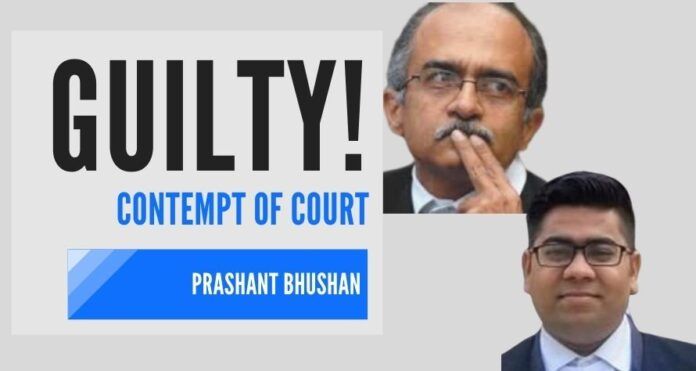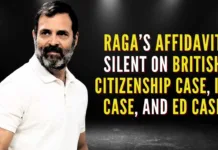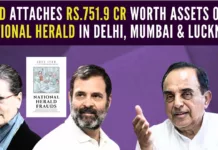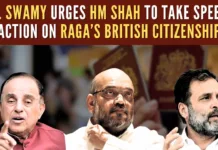
At last noted lawyer, Prashant Bhushan has been caught on a Contempt of Court case due to his abusive, maligning, and visceral hatred towards those who oppose his ideology. His tweets are often aggressive and on the edge, something one does not expect from a senior lawyer. But he was escaping from prosecution due to his clout and the brouhaha created by his Left-Liberal coterie. This time luck was not with Prashant Bhushan and he fell flat on a complaint filed by a young lawyer Mehek Maheshwari.
The Supreme Court bench headed by Justice Arun Mishra, comprising Justices B R Gavai and Krishna Murari on Friday held Prashant Bhushan guilty of Contempt of Court for abusive tweets against former Chief Justices of India and the current Chief Justice. Twitter was let off for not blocking the abusive tweets. The Court will hear on August 20 on the quantum of punishment. Bhushan is also facing a Contempt Case for accusing around eight Chief Justices of corruption in 2010. Senior Lawyer Harish Salve revived this case after Supreme Court issued notice and took suo moto cognisance on young lawyer Mehek Maheshwari’s complaint[1].
Mehek Maheshwari Vs Prashant Bhushan which turned into a suo moto case initiation by Supreme Court is like a typical David and Goliath kind of fight. Prashant Bhushan who believes that he wields a lot of clout in the legal world fell before a 29-year-old young lawyer’s googly. Mehek Maheshwari aged 29, became a lawyer in 2018 after graduating from a law college in his hometown of Guna in Madhya Pradesh, which has created history in the legal world. While studying for a Chartered Accountant’s Course, he switched over to the legal profession and became an intern at BJP leader Dr. Subramanian Swamy’s law office. He is also an active member of Swamy’s Virat Hindustan Sangam (VHS).
Reacting to Supreme Court Judgment, Mehek Maheshwari tweeted:
Lord denning said Whomsoever high u may be but Law is always above you.
Finally in Contempt case initiated on my Petition which then court converted suo moto, found guilty of contempt Mr.Bhushan. sentence will be pronounced on 20th august.@utkarsh_aanandhttps://t.co/ZyjvHuLbHC— Mehek Maheshwari (@MehekMaheshwari) August 14, 2020
Yes, Prashant Bhushan just forgot the famous saying of Judge Lord Denning’s that is taught in Law school: “Be you ever so high, the law is above you.” Hope Prashant Bhushan and the Gang will remember this famous saying.
References:
[1] If such an attack is not dealt with, it may affect national honour and prestige: Supreme Court in Prashant Bhushan contempt verdict – Aug 14, 2020, BarAndBench.com
- Prime Minister Narendra Modi: A Gujju businessman who does not invest his precious time for a losing battle - April 13, 2024
- NIA arrests two accused Shazib and Taahaa in Bengaluru’s Rameshwaram Cafe blast case from Kolkata - April 12, 2024
- National Herald scam: Adjudicating Authority upholds Rs.752 crore assets attached by ED - April 11, 2024











[…] Noted lawyer Prashant Bhushan falls flat on young lawyer Mehek Maheshwari’s case on Contempt of Co… – Aug 15, 2020, […]
[…] Noted lawyer Prashant Bhushan falls flat on young lawyer Mehek Maheshwari’s case on Contempt of Co… – Aug 15, 2020, […]
[…] Noted lawyer Prashant Bhushan falls flat on young lawyer Mehek Maheshwari’s case on Contempt of Co… – Aug 15, 2020, […]
[…] Noted lawyer Prashant Bhushan falls flat on young lawyer Mehek Maheshwari’s case on Contempt of Co… – Aug 15, 2020, […]
[…] Noted lawyer Prashant Bhushan falls flat on young lawyer Mehek Maheshwari’s case on Contempt of Co… – Aug 15, 2020, […]
Can a complaint of this nature can be taken up suomotto without AGs approval ?? What is the status of original complainant ? Is court in the shoes of complainant ? Is it set precedence ? I request somebody to delve on these issues. I understand the complainant professes BJP idealogical ?
[…] Noted lawyer Prashant Bhushan falls flat on young lawyer Mehek Maheshwari’s case on Contempt of Co… […]
Pgurus article biased
Got any facts to rebut? This is a Supreme Court ruling… What is the bias in it?
Mr Bhushan has to be punished even if symbolically to emphasise that the Court is supreme and all citizens have to live within the limits enshrined in the Constitution..The apparent arrogance of the super star advocates has to be dissolved
He is misusing democracy and freedom of speech for abusing others and mainly against Hinduism. Freedom of speech doesnt means that you can say anything against any religion or anyone.He must be punished and example must be set that no one is above the law and people cant hurt another sentiments.
Punishing Mr Prashant Bhushan under contempt of Court is easier said than done. He can drag the case by first filing Review Petition, then Curative Petition and finally when everything fails, he can file Mercy Petition before President of India. Its a long drawn affair even after the proposed pronouncement of quantum of punishment for contempt of Court by SC on 20th August 2020.
1. REVIEW PETITION : In India, a binding decision of the Supreme Court/High Court can be reviewed in a Review Petition. A review petition can be filed by the party aggrieved by the decision of Supreme Court. The provision of review is an exception to the principle of stare decisis as Courts generally do not unsettle a decision, without a strong case.
As per Article 137 of the Constitution of India and the rules made under Article 145, the Supreme Court of India has the power to review its judgment pronounced by it. As per Supreme Court rules, 1966 such a petition is to be filed WITHIN THIRTY DAYS of the pronouncement of judgment or order and that petition should be circulated without oral arguments to the same bench that delivered the judgment.
Furthermore, if a Review petition is dismissed by the Supreme Court, it may consider a Curative Petition filed by the petitioner so as to prevent abuse of process. In accordance with Order XVII, Rule1(1) of Code of Civil Procedure, 1908, a civil review petition can be moved. While a Criminal Review Petition can be filed ONLY ON THE GROUND OF ERROR APPARENT ON THE FACE OF RECORD.
2. CURATIVE PETITION
The Supreme court of India evolved the concept of curative petition in the landmark case of Rupa Ashok Hurra vs. Ashok Hurra and Anr. (2002) where a question was raised that whether an aggrieved person is entitled to any relief against the final order/judgment of the Supreme court after dismissal of review petition. In this case it was held by the Supreme Court that so as to prevent abuse of process as well as to cure miscarriage of justice, it may reconsider its judgments. The Court has devised a term ” curativeâ ” for this purpose. The petitioner is required to aver specifically that the grounds mentioned that had been taken in the Review Petition filed earlier and also it was dismissed by circulation.
A Curative Petition is required to be certified by a Senior Advocate and then it is circulated to the three senior most judges and the judges who delivered the impugned judgment. There is no time limit for filing a curative petition and it is guaranteed under Article 137 of the Constitution of India.
Essentials of Curative Petition
The Supreme Court has laid down specific conditions in order to entertain Curative Petition which are as follows:
* It has to be established by the Petitioner that there was a genuine violation of principles of natural justice.
* It shall be specifically stated in the petition that the grounds mentioned had been taken in the petition and
that it was dismissed by circulation.
* The curative petition shall be certified by a senior advocate.
* The curative petition is then circulated to the three senior most judges and also to the judges who passed
the impugned judgment.
* If majority of the judges agree that the matter needs hearing, then it would be sent to the same bench.
Exemplary costs could be imposed by the Court to the Petitioner if his plea lacks merit.
3. MERCY PETITION
In the context of Indian Judicial System, Mercy Petition is the last resort. When a person has lost all the remedies available to him under all the prevailing laws as well as under the Constitutional remedies, he may file a mercy petition before the President of India under Article 72 of the Indian Constitution or the Governor of the State under Article 161 of the Indian Constitution. Then the petition of his will be treated on mercy not on the legality of the case. In terms of Article 72 of the Indian Constitution, President of India is empowered to reprieve, respite or remit punishment pronounced by the Apex Court. However, the power to grant pardon is not discretionary as any decision is reached by consulting with the Council of Ministers.
In accordance with Article 161 of the Indian Constitution, Governor of the State shall have the power to reprieve, respite or remit punishment of any person convicted of any offence.
One can safely conclude that Mr Prashant Bhushan may exercise the option of filing Review Petition and Curative Petition before SC, but whether he will exercise the option of filing Mercy Petition before President of India, is a MOOT QUESTION. Anyway, it is certainly a good case for all Law Students to keep a track and study for their project work.
Such a lengthy process is prescribed under the law, to protect the rights of the Petitioner, on the hallowed premise ” Let 100 Criminals escape the long arm of the law, but one innocent should not be punished.”
Thank you Sir for providing detailed provisions under which Mr. Bhushan can evade escape the punishment from the CJI . I have my reservation only to the last option i.e 3: Mercy petition to the President under article 72 of the constitution. My understanding is that President is not eligible to pardon the sentence of contempt as it does not fall under the three provisions under which the President may exert the pardon option. I may be completely wrong,its just my understanding of the provision.
Thank you sir. This comment is as valuable as the article!
I think in case of suomotto ,there is no written provision for review portion. Constitution and legal procedure of supreme court are silent on this aspect.
Wish to see Chidambaram spends his last years in jail & Pappu family for their National herald crimes
Supreme Court will lose credibility if it condones the mistake and doesn’t put this person in jail.
Prashant Bhushan senior advocate conferment should be withdrawn as a quantum of punishment along with six months imprisonment. We the people of India lost good productivity of SC due to sheer ,Ego,bias and prejudice of the most disliked SC lawyer in the history of indian jurisprudence
Prashant Bhushan deserves this…. He must rectify